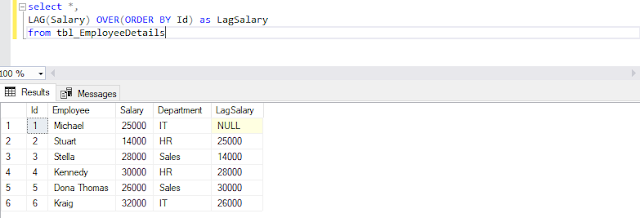 |
| LAG Function in SQL Server |
The syntax for LAG function is,
In LAG function partition_by_clause is optional, order_by_clause is required. You can specify any number of columns in the order_by_clause. The offset denotes the number of rows to lag. The default_value to return if the number of rows to lag goes beyond last row in a table or partition. If the default_value is not specified NULL is returned.
In order to achieve this we are going to use "tbl_EmployeeDetails" table for our demo.
CREATE TABLE [dbo].[tbl_EmployeeDetails](
[Id] [bigint] IDENTITY(1,1) NOT NULL,
[Employee] [varchar](450) NULL,
[Salary] [decimal](18, 0) NULL,
[Department] [varchar](350) NULL,
CONSTRAINT [PK_tbl_EmployeeDetails] PRIMARY KEY CLUSTERED
(
[Id] ASC
)WITH (PAD_INDEX = OFF, STATISTICS_NORECOMPUTE = OFF, IGNORE_DUP_KEY = OFF, ALLOW_ROW_LOCKS = ON, ALLOW_PAGE_LOCKS = ON) ON [PRIMARY]
) ON [PRIMARY]
GO
-- insert some sample data
insert into tbl_EmployeeDetails(Employee,Salary,Department) values('Michael',25000,'IT');
insert into tbl_EmployeeDetails(Employee,Salary,Department) values('Stuart',14000,'HR');
insert into tbl_EmployeeDetails(Employee,Salary,Department) values('Stella',28000,'Sales');
insert into tbl_EmployeeDetails(Employee,Salary,Department) values('Kennedy',30000,'HR');
insert into tbl_EmployeeDetails(Employee,Salary,Department) values('Dona Thomas',26000,'Sales');
insert into tbl_EmployeeDetails(Employee,Salary,Department) values('Kraig',32000,'IT');
[Id] [bigint] IDENTITY(1,1) NOT NULL,
[Employee] [varchar](450) NULL,
[Salary] [decimal](18, 0) NULL,
[Department] [varchar](350) NULL,
CONSTRAINT [PK_tbl_EmployeeDetails] PRIMARY KEY CLUSTERED
(
[Id] ASC
)WITH (PAD_INDEX = OFF, STATISTICS_NORECOMPUTE = OFF, IGNORE_DUP_KEY = OFF, ALLOW_ROW_LOCKS = ON, ALLOW_PAGE_LOCKS = ON) ON [PRIMARY]
) ON [PRIMARY]
GO
-- insert some sample data
insert into tbl_EmployeeDetails(Employee,Salary,Department) values('Michael',25000,'IT');
insert into tbl_EmployeeDetails(Employee,Salary,Department) values('Stuart',14000,'HR');
insert into tbl_EmployeeDetails(Employee,Salary,Department) values('Stella',28000,'Sales');
insert into tbl_EmployeeDetails(Employee,Salary,Department) values('Kennedy',30000,'HR');
insert into tbl_EmployeeDetails(Employee,Salary,Department) values('Dona Thomas',26000,'Sales');
insert into tbl_EmployeeDetails(Employee,Salary,Department) values('Kraig',32000,'IT');

Notice that we haven't specified the offset and default value in the above statement. If you don't specify the offset by default it will take as 1, If you don't specify the default_value it will return as NULL like you can see in the below result set.
Suppose, If you want to lag the result set based on the descending order of the Id, your query should be like this:
The returned result is,In order to lag with different offset and default value. your SELECT statement should be like this:
In above statement the value 2 denotes the lag offset it will lag two rows from the current row. The 0 indicates the default value.
The statement returned result is,
Now, Lets see how to use partition_by_clause in LAG function?
The partition_by_clause divides our department and produces the 'LagSalary' based on the offset and default value.





Comments